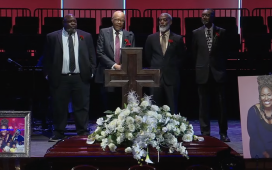The prime minister’s marriage to Carrie Symonds in Westminster Cathedral has left many Catholics with a question. If the mother church of the Catholic church in England and Wales can kill the fatted calf and welcome the twice-divorced prime minister as a prodigal son, why are so many other divorcees being turned away?
People are upset by what feels like double standards. Too often it seems church leaders are willing to bend over backwards to accommodate the powerful in ways the poorest, or those without influence, are simply not offered.
While the prime minister’s colourful record on marriage presents no impediment to a cathedral wedding, there are countless of other divorcees who have been refused a church marriage unless they get an annulment. Same-sex couples, meanwhile, were told by the Vatican recently that church blessings are impossible for them because God “cannot bless sin”.
According to church rules, the prime minister and his wife, who is a Catholic, were within their rights to be married in the cathedral. They got the green light because Johnson’s earlier marriages took place outside the Catholic church and without the necessary permissions. As he is a baptised Catholic, those marriages are invalid in the church’s eyes and he was free to marry. All of this is fine if you are comfortable with the intricacies of canon law, but to outsiders it looks like Mr and Mrs Johnson found a legal loophole.
All that being said, I believe Catholics should welcome the news of the prime minister’s marriage and support him and his wife in their married life. Pope Francis has repeatedly called for a “field hospital” church, one that welcomes everyone, and recognises the complex realities of people’s lives. Any marriage is a cause of celebration.
And yet, as Jesus also warns his followers, Christians need to be “wise as serpents and innocent as doves”. While the pope wants a more inclusive and merciful church, he is allergic to any attempts to politicise Catholicism. He does not want the church getting pulled into party politics.
Following the Westminster Cathedral nuptials, there have been reports that the wedding was a “triumph” for the prime minister’s wife in her Downing Street battle with Dominic Cummings, Johnson’s former chief adviser. To some observers the cathedral marriage, taking place just a few days after Cummings gave explosive evidence against his former boss, was well timed. It would be unfortunate if the church was being played as part of a political turf war.
All of this could point to a religious strand emerging in the political battles inside Downing Street. In Boris Johnson, Britain has its first Catholic prime minister. Yes, he was confirmed as an Anglican while at Eton, but in the eyes of the church he remains a Catholic. Furthermore, the baptism of his son in the cathedral, and his marriage in the same place, suggests he affiliates with Catholicism.
A Catholic prime minister would mark a watershed in the history of British Catholicism. Tony Blair, who regularly attended mass as prime minister, decided not to convert until after he left office. He waited in part due to the constitutional complications associated with the prime minister’s role advising the crown on the appointments of Church of England bishops. According to the 1829 Roman Catholic Relief Act, it was unlawful for anyone “professing the Roman Catholic religion” to be involved in offering this advice, although constitutional changes by Gordon Brown significantly reduced the prime minister’s role in bishop appointments. Blair, a serious believer, was also wary of what it would look like if he became a Catholic while in office, pointing to the wariness in the British electorate of anyone too open about their religious faith. There was also concern about latent anti-Catholicism in the establishment.
After persecution following the Reformation, and the years of hostility and suspicion faced by Catholics in public life, a line should now be drawn under the anti-Catholicism of the past. It is a story which should offer encouragement to other religious minorities in the UK.
Later this year, the UK will host the cop26 climate change summit. It looks increasingly likely the pope will travel to Glasgow for the event, Covid-19 restrictions permitting. Protecting the environment has been high on the pontiff’s agenda throughout his pontificate, and he’s received an invitation to attend the event. Should Francis come to Glasgow, he is likely to be greeted by Mr and Mrs Johnson soon after his arrival. A pope meeting a prime minister and his wife, both of whom are Catholics, is something which would have been unthinkable 40 years ago.
Nevertheless, caution is needed. Getting too close to power is full of pitfalls for the Catholic church, and it’s still slightly vague about where Johnson’s religious convictions really lie. Unlike Blair who practised his faith, Johnson might be described as a “resting Catholic”.
The prime minister is sometimes likened to Henry VIII. Like Henry, who broke with Rome after the pope refused him an annulment so he could marry his second wife Anne Boleyn, Johnson led Britain’s second break with the continent through Brexit. But Johnson has gone even further than Henry. He has managed for his third marriage to be blessed by the Catholic church.





